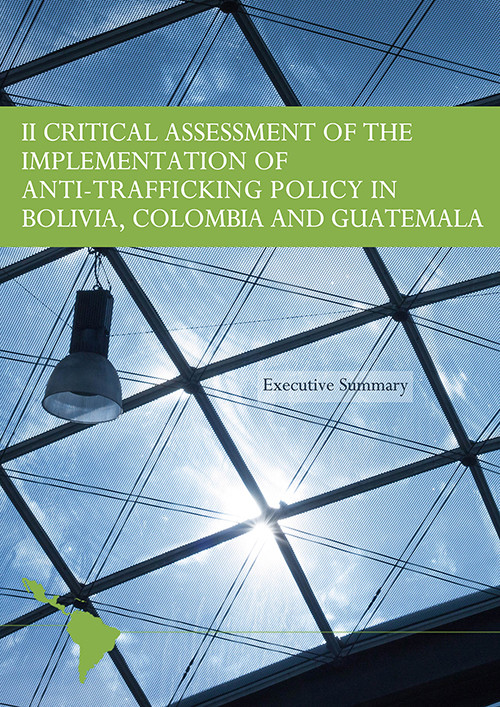For the second year in a row, Fundación La Paz, Corporación Espacios de Mujer and ECPAT, with the support of the International Secretariat of GAATW, conducted an analysis of anti-trafficking policies and services in Bolivia, Colombia and Guatemala to assess the gap between what the legislation states and the services actually provided.
The reports find that the legislation against human trafficking is still not effectively implemented in any of the three countries. Institutions are not fulfilling all of their responsibilities nor are they facilitating the restitution of the violated rights of trafficked persons. Not only is there an inadequate budget allocation to enforce the law, but most institutions responsible for prevention, care or prosecution are unaware of the budget available for their implementation. There is no uniformity in the collection of information, which results in a high degree of ambiguity and, therefore, a lack of knowledge about the crime and associated violations. A proper recording of trafficking cases would make it possible to classify and quantify information for the purpose of designing more appropriate public policies.
One need identified in all three countries is ongoing training of specialists involved in the processes of identification, care, protection and prosecution. Finally, it is worrisome that states generally continue to fail to link prevention strategies with public policies that deal with structural aspects, such as poverty or the guarantee of basic rights.
Download the Executive Summary
Por segundo año consecutivo Fundación La Paz, Corporación Espacios de Mujer y ECPAT, con el apoyo del secretariado internacional de GAATW, han llevado a cabo un análisis de la implementación de las políticas anti-trata en Bolivia, Colombia y Guatemala respectivamente.
Se puede afirmar que la legislación contra la trata de personas sigue sin aplicarse efectivamente en ninguno de los tres países. Las instituciones no cumplen con el total de sus responsabilidades ni se está propiciando la restitución de los derechos vulnerados a las personas objeto de trata. No solo falta la debida asignación presupuestaria específica para poder ejecutar la Ley, sino que además la mayor parte de las instituciones responsables de acciones de prevención, atención o persecución desconocen el presupuesto disponible para la ejecución de dichas acciones. Destaca también la falta de uniformidad en la recogida de información lo que conlleva una gran ambigüedad en la información disponible y por tanto un desconocimiento del delito. Un registro adecuado de los casos de trata permitiría tipificar y cuantificar la información en aras de diseñar políticas públicas más adecuadas.
Una necesidad identificada en los tres países es la formación permanente a las personas involucradas en cualquier nivel de los procesos de identificación, atención, protección y persecución del delito sobre el delito de trata de personas y en materia de derechos humanos. Por último, es preocupante que en general los Estados sigan sin relacionar las estrategias de prevención con políticas públicas que afronten aspectos estructurales como la pobreza o la falta de cobertura de derechos básicos.
Descargar el Informe Ejecutivo
II Balance de la implementación de las políticas anti-trata en Bolivia
II Balance de la implementación de las políticas anti-trata en Colombia
II Balance de la implementación de las políticas anti-trata en Guatemala

